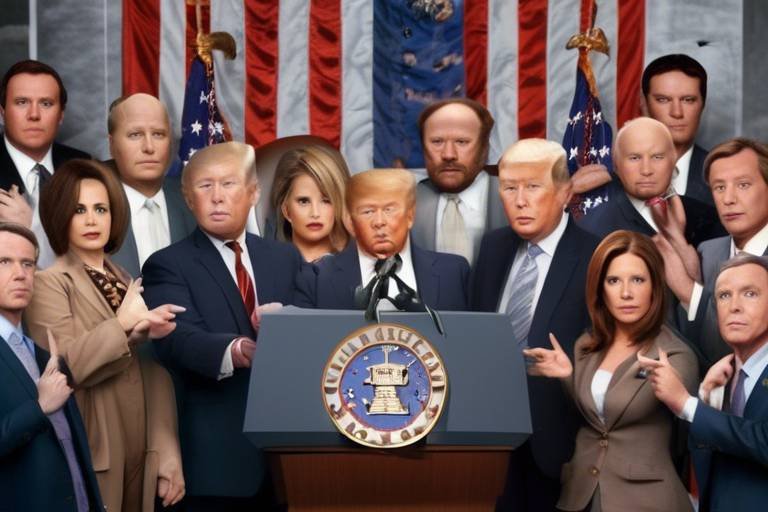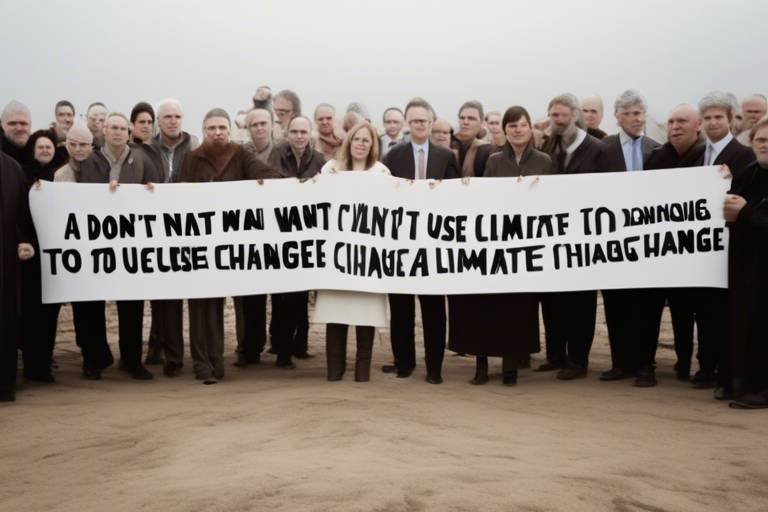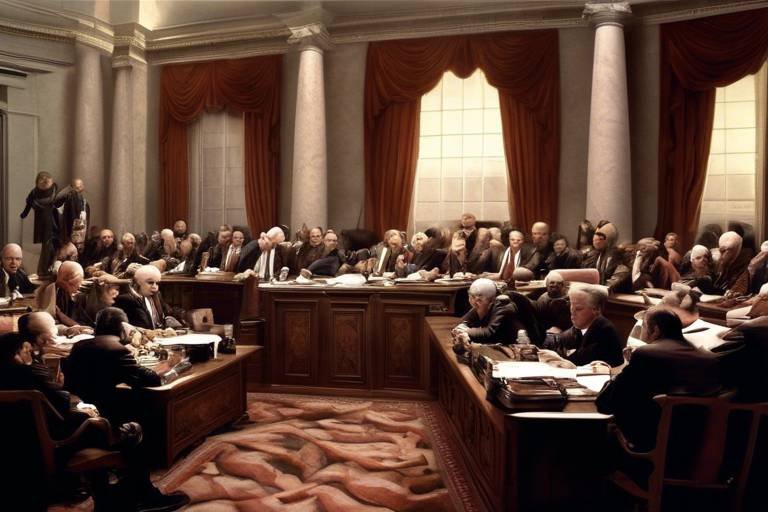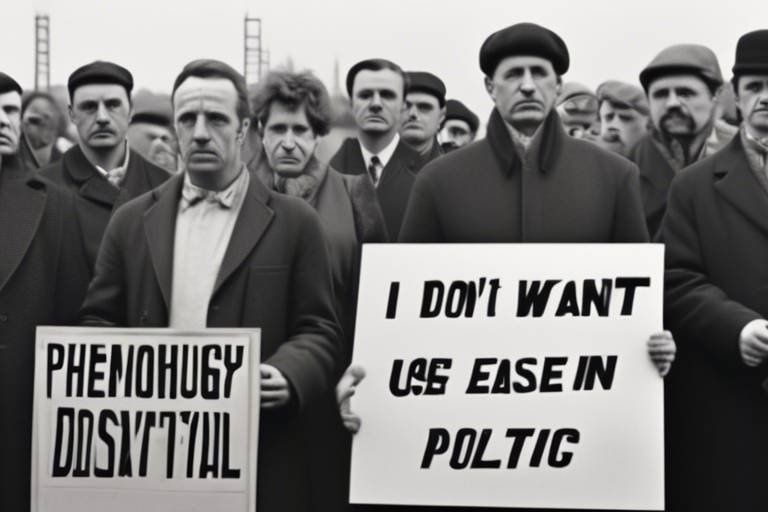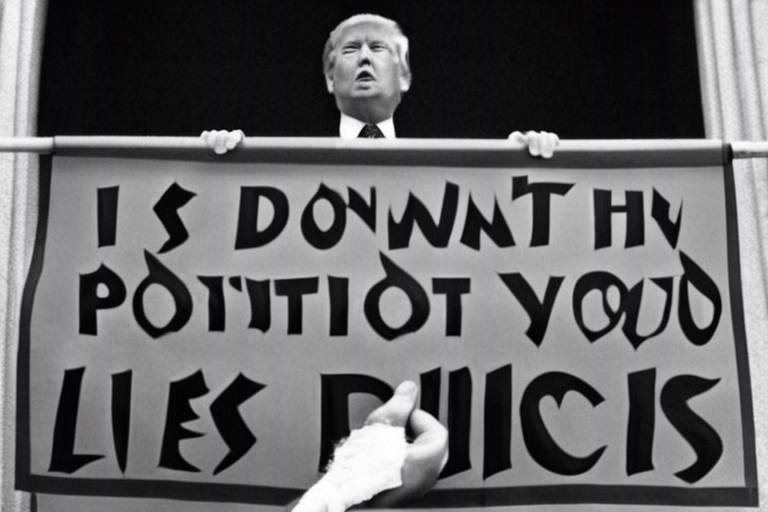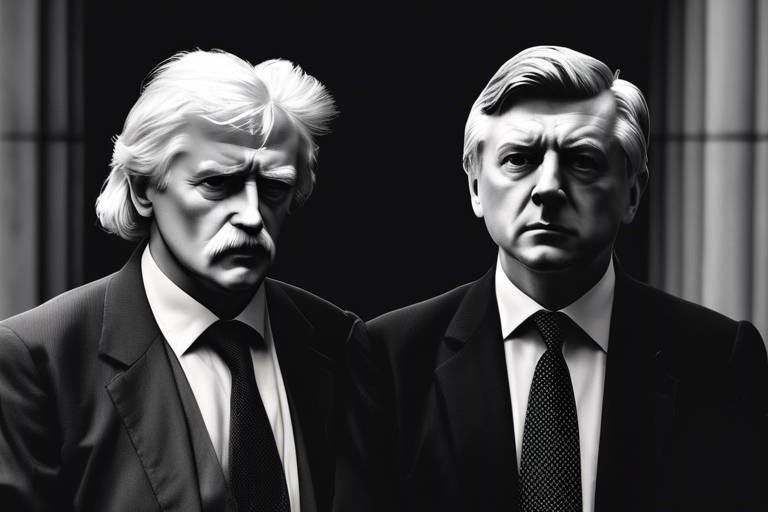John Locke - Politics from a Philosophical Perspective
John Locke, a pivotal figure in the realm of political philosophy, has left an indelible mark on how we understand governance, individual rights, and the very fabric of society. Born in 1632, Locke's writings emerged during a time of significant political upheaval in England, which profoundly influenced his thoughts on human nature and society. His ideas, particularly those concerning the social contract, have shaped modern political thought and continue to resonate in contemporary discussions about freedom and authority. Locke's philosophy invites us to ponder fundamental questions about the nature of power: What is the role of government? How do we ensure our rights are protected? And, most importantly, what happens when those in power fail to uphold their end of the bargain?
Locke's concept of the state of nature is foundational to his political philosophy. He describes it as a pre-political society where individuals exist in a state of perfect freedom and equality. Imagine a world where everyone is governed not by laws but by reason and natural law. In this state, people are free to pursue their own interests, but they are also bound by the obligation to respect the rights of others. This balance is crucial, as it sets the stage for the emergence of government. But what happens when this natural order is disrupted? Locke believed that in such cases, individuals would agree to form a government to restore peace and protect their rights.
At the heart of Locke's philosophy are the natural rights of life, liberty, and property. These rights are not granted by any government; rather, they are inherent to every individual by virtue of being human. Locke argued that the primary purpose of government is to safeguard these rights. If a government fails in this duty, it loses its legitimacy. This notion introduces a powerful idea: the government exists to serve the people, not the other way around. In Locke's view, a just society is one where natural rights are respected and protected, fostering an environment where individuals can thrive.
Locke takes his argument further by asserting that citizens possess the right to revolution against a government that fails to protect their natural rights. This concept is revolutionary in itself; it places the power back into the hands of the people. Imagine living under a regime that disregards your rights—Locke's philosophy empowers you to challenge that authority. He emphasizes the importance of accountability and consent in governance, arguing that a government must be responsive to the needs of its citizens. If it becomes tyrannical, the people have not just the right, but the duty, to resist.
According to Locke, the legitimacy of governmental authority is derived from the consent of the governed. This idea is a cornerstone of democratic principles. Just as a contract binds two parties, so too does the social contract bind citizens and their government. The government is granted power only through the explicit consent of the people it governs. This perspective challenges the notion of divine right or absolute rule, advocating instead for a system where the authority is accountable to its citizens.
Locke's social contract theory posits that individuals collectively agree to form a government to protect their rights. This agreement is not merely a formality; it is a fundamental shift in how we understand authority. By entering into this contract, citizens willingly relinquish some of their freedoms to gain the protection of their natural rights. This mutual agreement serves as the bedrock for modern democratic systems, where the government is seen as a representative entity that exists to serve the people.
Locke's ideas have profoundly influenced contemporary democratic thought. His theories on individual rights, representative government, and the rule of law are embedded in the frameworks of many modern political systems. Countries around the world have drawn inspiration from Locke's vision, using his principles as a guiding light in the establishment of their own democracies. The echoes of his philosophy can be heard in the founding documents of nations, advocating for a government that is both accountable and responsive to its citizens.
Locke strongly advocates for a separation of powers within government to prevent tyranny. He believed that by dividing governmental functions into distinct branches—legislative, executive, and judicial—each branch could act as a check on the others. This separation is crucial in maintaining a balance of power and ensuring that no single entity becomes too powerful. Think of it as a well-oiled machine where each part has its role, working together to ensure the smooth functioning of the whole.
The system of checks and balances is essential in Locke's vision. Each branch of government has the authority to limit the powers of the others, thus safeguarding individual liberties. This mechanism not only prevents abuse of power but also fosters a sense of accountability among those in positions of authority. In essence, it creates a political environment where the government must justify its actions to the people, reinforcing Locke's belief in the importance of consent and representation.
Locke's political philosophy continues to resonate today, inspiring movements for democracy and human rights across the globe. His ideas have shaped the frameworks of various political institutions and continue to influence discussions about governance and individual rights. As we navigate the complexities of modern politics, Locke's emphasis on the protection of natural rights and the importance of government accountability remains as relevant as ever. His legacy serves as a reminder that the fight for justice and equality is ongoing, and that the power ultimately lies with the people.
- What are John Locke's main contributions to political philosophy? Locke is known for his theories on natural rights, the social contract, and the separation of powers.
- How does Locke define the state of nature? He describes it as a condition where individuals are free and equal, governed by natural law and reason.
- What is the significance of the right to revolution? It empowers citizens to overthrow a government that fails to protect their natural rights.
- How has Locke influenced modern democracy? His ideas on individual rights and government accountability are foundational to contemporary democratic systems.

The State of Nature
Locke's concept of the state of nature is not just a philosophical idea; it's a vivid portrayal of human existence before the establishment of governments. Imagine a world where people are not shackled by laws and regulations, where everyone is free to act according to their own reason and conscience. This state, as Locke describes, is one of perfect freedom and equality. However, it’s essential to note that this freedom is not chaotic; instead, it is governed by natural law—a moral framework that dictates how individuals should treat one another.
In this pre-political society, individuals possess inherent rights that are not granted by any authority but are instead a fundamental part of their human existence. Locke argues that these rights are universal, applying to all individuals regardless of their circumstances. The key rights in this state of nature include:
- Life: The right to live and not be harmed.
- Liberty: The freedom to act as one chooses, as long as it does not infringe on the rights of others.
- Property: The right to own and control possessions, which is an extension of one’s labor.
However, while the state of nature sounds idyllic, it also harbors potential conflicts. With everyone having the freedom to act, disputes can arise over resources, leading to a state of constant tension. Locke suggests that this is where the need for a structured society becomes apparent. Without a common authority to resolve conflicts, the state of nature can quickly devolve into a battleground of competing interests. Hence, the transition from the state of nature to organized society becomes a necessity for the protection of these natural rights.
Locke's insight into the state of nature serves as a foundation for his broader political philosophy. It raises critical questions about governance and the role of individuals in society. Are we better off in a state of freedom, or do we require the constraints of government to protect our rights? This philosophical inquiry leads us to the next significant aspect of Locke's thought: the social contract, where individuals agree to form a government to safeguard their natural rights.
In conclusion, the state of nature is more than just a theoretical construct; it is a reflection of our innate desires for freedom, equality, and justice. Locke’s exploration of this concept not only challenges us to think about our current societal structures but also invites us to consider the essence of what it means to be human in a world governed by laws and social norms.
What is the state of nature according to John Locke?
Locke describes the state of nature as a condition where individuals are free and equal, governed by natural law and reason, without the interference of political institutions.
What are the key rights in the state of nature?
The key rights include life, liberty, and property, which are inherent to all individuals and must be protected by any government.
Why is the state of nature important in Locke's philosophy?
The state of nature is crucial because it sets the stage for understanding why individuals choose to form governments and enter into a social contract for the protection of their rights.

Natural Rights
At the heart of John Locke's political philosophy lies the concept of , which are fundamental to the existence of a just society. Locke posits that every individual is born with certain inalienable rights that are not granted by any government but are inherent to human nature. These rights primarily encompass life, liberty, and property. Imagine these rights as the bedrock of a house; without them, the structure of a fair society cannot stand. Locke believed that the role of government is to protect these rights, ensuring that individuals can live freely and pursue their interests without interference.
Locke's emphasis on reflects a revolutionary shift in political thought. Prior to his theories, many believed that rights were bestowed by monarchs or governing bodies. Locke, however, argued that these rights are universal and must be respected by all, including the state. This perspective laid the groundwork for modern democratic ideals, where the government derives its power from the consent of the governed. In Locke's view, if a government fails to uphold these natural rights, it loses its legitimacy and the people have the right to challenge it.
To illustrate the importance of these natural rights, consider the following table that summarizes their key components:
| Natural Right | Description |
|---|---|
| Life | The right to live and not be harmed by others. |
| Liberty | The freedom to act according to one's own will, as long as it does not infringe on others' rights. |
| Property | The right to own and control possessions and resources. |
Locke's assertion that these rights are inalienable means that they cannot be surrendered or transferred. This idea resonates deeply in the context of modern human rights discussions. For instance, when we talk about the right to free speech or the right to privacy, we are essentially referring to Locke's notion of liberty. Furthermore, the right to property remains a contentious issue in political debates, especially regarding wealth distribution and social justice.
In Locke's framework, the protection of these rights is not merely a governmental duty; it is a social contract between the state and its citizens. When individuals agree to form a society, they consent to relinquish a portion of their freedom in exchange for the protection of their natural rights. This mutual agreement ensures that the government remains accountable to the people, reinforcing the idea that citizens are not subjects but active participants in their governance.
As we navigate the complexities of modern governance, Locke's principles continue to serve as a guiding light. The ongoing struggles for human rights and social justice around the globe echo his beliefs. When we advocate for the protection of individual rights, we are, in essence, championing the very foundation that Locke laid centuries ago.
- What are natural rights? Natural rights are fundamental rights inherent to all individuals, including life, liberty, and property, which must be protected by the government.
- Why are natural rights important? They serve as the foundation for a just society and ensure that individuals can live freely without oppression.
- How do natural rights relate to modern democracy? They underpin democratic ideals by emphasizing that government derives its legitimacy from the consent of the governed and must protect these rights.

The Right to Revolution
When we talk about the right to revolution, we're diving into one of the most intriguing aspects of John Locke's political philosophy. Locke boldly asserts that if a government fails to uphold its duty to protect the natural rights of its citizens, those citizens are not just allowed, but are morally justified in rising up against it. Imagine a ship captain who steers his vessel into treacherous waters, ignoring the warnings of his crew. What do you think would happen? The crew would likely take action to save themselves from disaster. In the same way, Locke believes that individuals have the inherent right to challenge and overthrow a government that becomes tyrannical or oppressive.
Locke's vision of revolution is not just a call to arms; it's a profound statement about accountability and consent. He emphasizes that governments are formed through the consent of the governed, and when that consent is violated, the social contract is effectively broken. This leads to a fundamental question: if a government is not serving its people, what purpose does it serve? For Locke, the answer is clear: it loses its legitimacy and must be replaced. This idea resonates deeply in the context of modern political movements, where citizens often feel unheard and unrepresented.
To better understand Locke's perspective, let's break down the implications of the right to revolution:
- Accountability: Governments must be held responsible for their actions and policies.
- Consent of the Governed: The legitimacy of authority hinges on the approval of the people.
- Protection of Rights: If a government fails to protect the natural rights of life, liberty, and property, it forfeits its right to govern.
Locke also highlights the importance of a peaceful approach to revolution, advocating for a measured response rather than chaotic upheaval. He recognizes that revolutions can lead to instability and violence, which is why he suggests that citizens should first seek to address grievances through dialogue and reform. However, when all avenues for peaceful resolution have been exhausted, the right to revolution stands as a powerful tool for restoring justice and equity.
In essence, Locke's right to revolution is a double-edged sword; it empowers citizens while simultaneously placing a heavy burden on them to act responsibly. The challenge lies in distinguishing between a legitimate uprising and mere rebellion for the sake of chaos. This philosophical framework not only influenced the American and French revolutions but continues to inspire movements for justice and equality around the globe.

Legitimacy of Authority
The concept of legitimacy in governance is a cornerstone of John Locke's political philosophy. For Locke, the authority of a government is not derived from sheer force or coercion but rather from the consent of the governed. This idea is revolutionary and has profound implications for how we understand political power today. Imagine a ship sailing on the open sea; the captain's ability to steer the ship is only valid if the crew has agreed to follow him. Similarly, a government can only claim rightful authority if its citizens have willingly consented to be governed.
Locke argues that legitimate authority is established through a social contract, wherein individuals come together to form a government that is tasked with protecting their natural rights—specifically, life, liberty, and property. When citizens agree to this contract, they effectively grant the government the power to enforce laws and make decisions on their behalf. However, this power is not unlimited. If the government fails to uphold its end of the bargain, the citizens are justified in withdrawing their consent. This idea introduces a dynamic relationship between the people and their government, characterized by accountability and mutual respect.
To illustrate Locke's perspective on legitimacy, consider the following table that outlines the key components of legitimate authority:
| Component | Description |
|---|---|
| Consent | Authority must be granted by the people, emphasizing voluntary agreement. |
| Protection of Rights | The primary role of government is to safeguard the natural rights of individuals. |
| Accountability | Governments must be answerable to the citizens, who can withdraw their consent if necessary. |
| Rule of Law | Authority must operate within established laws that apply equally to all. |
Locke's vision of legitimacy is particularly relevant in today’s political landscape. The principles of democracy and human rights are deeply intertwined with the notion that authority must be derived from the will of the people. When citizens feel that their voices are heard and their rights are protected, they are more likely to support and respect their government. Conversely, when authority is viewed as illegitimate—perhaps due to corruption or lack of representation—society can become fractured, leading to unrest and calls for change.
In essence, Locke's ideas challenge us to reflect on the nature of power and authority in our own lives. Are we governed by those who truly represent our interests? Do we hold our leaders accountable? These questions are not just philosophical musings; they are vital to ensuring that our political systems remain fair, just, and legitimate.
- What does Locke mean by 'legitimacy of authority'?
Locke's legitimacy of authority refers to the idea that a government's power must come from the consent of the governed, emphasizing accountability and the protection of individual rights. - How does the social contract relate to legitimacy?
The social contract is the agreement among individuals to form a government that protects their rights, and it is the basis for the legitimacy of that government's authority. - Why is consent important in Locke's philosophy?
Consent is crucial because it establishes the relationship between the government and the citizens, ensuring that authority is not imposed but rather agreed upon.

Social Contract Theory
John Locke's is a cornerstone of his political philosophy, serving as a bridge between the state of nature and the establishment of government. According to Locke, individuals in a state of nature possess natural rights that must be preserved and protected. However, living in a state of nature can be precarious, as there is no overarching authority to mediate disputes or enforce laws. This precariousness leads individuals to collectively agree to form a government, creating a social contract that outlines the roles and responsibilities of both the government and the governed.
The essence of this social contract lies in the mutual agreement between citizens and their government. Locke argues that individuals consent to surrender some of their freedoms in exchange for the protection of their fundamental rights. This exchange is not merely a trade-off; it is a profound commitment to a system that seeks to ensure justice and order. In Locke's view, the legitimacy of any government hinges on its ability to safeguard the natural rights of its citizens. If a government fails in this duty, it loses its legitimacy, and citizens are justified in seeking to alter or abolish it.
Locke's social contract is not a one-size-fits-all solution; rather, it is adaptable to the needs of the society it governs. This adaptability is vital, as it allows for the evolution of governance structures in response to changing societal values and norms. For instance, Locke's theory paved the way for the development of representative democracy, where elected officials act on behalf of the people, ensuring that their voices are heard in the governance process.
To better understand Locke's social contract, consider the following key principles:
- Consent: The legitimacy of government arises from the consent of the governed.
- Protection of Rights: The primary role of government is to protect the natural rights of individuals.
- Accountability: Governments must be held accountable for their actions, and citizens have the right to revolt if their rights are infringed upon.
In essence, Locke's Social Contract Theory is about establishing a framework where individuals can live in a society that respects their rights while promoting the common good. It underscores the importance of a government that is not only elected by the people but also responsive to their needs and concerns. The implications of Locke's theory extend far beyond his time, influencing the development of modern democratic systems worldwide.
1. What is the social contract according to John Locke?
The social contract, as defined by John Locke, is an agreement among individuals to form a government that protects their natural rights, including life, liberty, and property.
2. How does Locke's social contract differ from that of Hobbes?
While Hobbes believed in a strong central authority to prevent chaos, Locke emphasized the importance of consent and the right of citizens to revolt against an unjust government.
3. What happens if a government violates the social contract?
If a government fails to protect the natural rights of its citizens, Locke argues that the people have the right to alter or abolish that government.
4. How has Locke's social contract influenced modern democracy?
Locke's ideas have shaped contemporary democratic thought, emphasizing the principles of individual rights, representative government, and accountability in governance.

Influence on Modern Democracy
John Locke's political philosophy has had a profound impact on the development of modern democratic systems. His ideas about governance, individual rights, and the role of the state have shaped the very foundations of contemporary political thought. At the heart of Locke's influence is his unwavering belief in the importance of natural rights. He argued that every individual possesses inherent rights to life, liberty, and property. These rights are not granted by any government; rather, they are intrinsic to human beings and must be safeguarded by any political authority.
Locke's notion of the social contract further revolutionized the way we think about government. He posited that individuals willingly come together to form a society and establish a government, but only under the condition that this government will protect their natural rights. This concept laid the groundwork for the idea that governments derive their legitimacy from the consent of the governed. In essence, if a government fails to uphold its end of the bargain, the people have not only the right but the duty to revolt. This radical idea has inspired countless democratic movements throughout history, from the American Revolution to contemporary protests for human rights.
Moreover, Locke's emphasis on individual freedom and the rule of law has resonated deeply in modern democracies. His arguments highlight the necessity of a government that is accountable to its citizens, fostering an environment where the rights of individuals are prioritized. This accountability is often manifested through a system of checks and balances, ensuring that no single branch of government becomes too powerful. Locke's vision of a government that serves the people rather than rules over them is a principle that continues to be a cornerstone of democratic societies today.
To illustrate the lasting impact of Locke's ideas, consider the following table that outlines key aspects of his philosophy and their relevance in modern democracy:
| Locke's Philosophy | Modern Democratic Principle |
|---|---|
| Natural Rights | Protection of individual rights |
| Social Contract | Government accountability and consent |
| Right to Revolution | Citizens' right to protest and change government |
| Separation of Powers | Checks and balances in governance |
In summary, Locke's theories have not only influenced the formation of modern democratic thought but have also provided a framework for understanding the relationship between individuals and their government. His ideas encourage active participation in governance and remind us that democracy is not merely a system of government but a commitment to protecting the rights of every individual. As we navigate the complexities of modern political landscapes, the relevance of Locke's philosophy remains as significant as ever.
- What are John Locke's main contributions to political philosophy? Locke's main contributions include the concepts of natural rights, the social contract, and the right to revolution.
- How did Locke influence the American Revolution? Locke's ideas about government accountability and individual rights inspired the Founding Fathers to seek independence from British rule.
- What is the significance of the separation of powers in Locke's philosophy? The separation of powers is crucial as it prevents any one branch of government from becoming too powerful, ensuring a balance that protects individual liberties.

Separation of Powers
When we think about governance, one of the most crucial concepts that emerge is the . This idea, championed by John Locke, is like a safety net for democracy, ensuring that no single entity holds too much power. Imagine a three-legged stool; if one leg is too long or too short, the whole thing topples over. Similarly, in government, the legislative, executive, and judicial branches must maintain a balance to prevent tyranny and protect the rights of the individuals.
Locke believed that dividing government responsibilities among different branches is essential for a functioning democracy. Each branch has its unique role: the legislative branch makes the laws, the executive branch enforces them, and the judicial branch interprets them. This division not only promotes efficiency but also acts as a safeguard against the abuse of power. By having distinct functions, each branch can keep an eye on the others, creating a system of checks and balances.
In Locke’s vision, this separation is not just a theoretical concept; it is a practical necessity. He argued that when power is concentrated in one place, it leads to corruption and oppression. To illustrate this, consider the following table that outlines the functions of each branch:
| Branch | Function |
|---|---|
| Legislative | Creates laws |
| Executive | Enforces laws |
| Judicial | Interprets laws |
By ensuring that these branches operate independently, Locke believed that citizens could enjoy their natural rights without fear of oppression. This framework encourages accountability, as each branch is responsible for its actions and can be checked by the others. For example, if the executive branch oversteps its authority, the judicial branch can intervene, protecting the rights of the people.
Moreover, the separation of powers cultivates a culture of democratic engagement. When citizens understand that they have a role in holding each branch accountable, it fosters a sense of responsibility and participation in the political process. It’s like being part of a team where each player has a distinct role but works towards a common goal: the betterment of society.
In conclusion, Locke's advocacy for the separation of powers remains a cornerstone of modern democratic systems. It ensures that power is not only distributed but also regulated, allowing for a government that is both effective and accountable. Without this crucial separation, the very essence of democracy could be at risk, making it imperative for us to appreciate and uphold these principles in our political structures.
- What is the separation of powers? The separation of powers is a political doctrine that divides government responsibilities into distinct branches to prevent any one group from gaining too much power.
- Why is the separation of powers important? It is important because it creates a system of checks and balances, ensuring that each branch can monitor and limit the powers of the others, protecting individual rights and promoting accountability.
- How does the separation of powers work in practice? In practice, each branch operates independently but is designed to interact with the others, allowing for a balance of power and preventing overreach by any single branch.

Checks and Balances
In the grand tapestry of governance, the concept of serves as a vital thread woven through John Locke's political philosophy. Imagine a three-legged stool; if one leg is too short or too long, the stool becomes unstable. Similarly, in a government, if one branch holds too much power, the entire system risks tipping into tyranny. Locke, a visionary of his time, understood that a balanced government is essential for preserving individual liberties and ensuring that no single entity could dominate the political landscape.
At the heart of Locke's idea is the division of government into three distinct branches: the legislative, the executive, and the judicial. Each branch has its own unique functions and responsibilities, and, importantly, each serves as a check on the others. This framework not only promotes accountability but also fosters a culture of collaboration and transparency. Let's break down the roles of each branch:
| Branch | Primary Function | Checks on Other Branches |
|---|---|---|
| Legislative | Creates laws | Can override vetoes, approve appointments |
| Executive | Enforces laws | Can veto legislation, appoint judges |
| Judicial | Interprets laws | Can declare laws unconstitutional, review executive actions |
This table illustrates not only the distinct roles each branch plays but also how they interact with one another to maintain a system of governance that is both fair and just. By allowing each branch to limit the powers of the others, Locke's vision of checks and balances ensures that power is not concentrated in the hands of a few, thus safeguarding the rights of the individual.
Moreover, the system of checks and balances encourages a healthy dialogue among the branches. When the legislative branch proposes a new law, the executive must review it, and the judicial branch is there to ensure that it aligns with the constitution. This dynamic interaction creates a robust framework that not only protects against abuse of power but also fosters a sense of responsibility among those in authority.
In essence, Locke's checks and balances are not just theoretical constructs; they are practical mechanisms that have been implemented in various forms across modern democracies. By ensuring that each branch remains accountable to the others, we create a government that is truly of the people, by the people, and for the people. This principle resonates deeply in contemporary society, where movements for justice and equality continue to advocate for the rights and freedoms that Locke so passionately championed.
- What are checks and balances? Checks and balances are a system that ensures no single branch of government becomes too powerful by allowing each branch to limit the powers of the others.
- Why are checks and balances important? They are crucial for preventing tyranny and protecting individual rights by promoting accountability and transparency in government.
- How do checks and balances work in practice? Each branch of government has specific powers and responsibilities, and they interact with one another to ensure that laws are created, enforced, and interpreted fairly.

Legacy and Impact
John Locke’s political philosophy is not just a relic of the past; it is a vibrant part of our contemporary discourse on governance and human rights. His ideas have transcended time, influencing various democratic movements and shaping the political frameworks of numerous countries. Imagine a world where the principles of liberty and equality are not just ideals, but are woven into the very fabric of society. This is the legacy Locke has left behind.
Locke’s emphasis on natural rights—the rights to life, liberty, and property—has become a cornerstone of modern democratic thought. These rights are not granted by any government; rather, they are inherent to every individual. His assertion that the role of government is to protect these rights has inspired countless revolutions and reforms. For instance, the American and French revolutions drew heavily from Locke’s ideas, as revolutionaries sought to establish governments that reflected his vision of a society where individual rights are safeguarded.
Moreover, Locke’s concept of the social contract has been pivotal in shaping our understanding of governmental legitimacy. By positing that governments derive their authority from the consent of the governed, he laid the groundwork for democratic principles that are now commonplace. This notion has led to the establishment of systems where citizens actively participate in governance, ensuring that leaders are accountable to the people. Without Locke, the very idea of democracy as we know it today might not exist.
Locke’s impact extends beyond just political theory; it has permeated into the realms of law, education, and human rights. His ideas have influenced the development of constitutional law, promoting the idea that laws should protect individual freedoms. Educational institutions have also embraced Locke’s principles, advocating for the importance of critical thinking and individual agency in learning. His belief that every person has the right to pursue their own happiness has become a fundamental tenet of human rights movements worldwide.
To illustrate the breadth of Locke’s influence, consider the following table that outlines some key areas where his philosophy has made a significant impact:
| Area of Impact | Locke's Contribution | Modern Relevance |
|---|---|---|
| Political Theory | Natural Rights | Foundation of human rights declarations |
| Government Legitimacy | Consent of the Governed | Basis for democratic elections |
| Law | Rule of Law | Framework for constitutional democracies |
| Education | Critical Thinking | Encouragement of individual thought in curricula |
| Human Rights | Right to Revolt | Justification for civil disobedience movements |
In conclusion, John Locke’s legacy is a testament to the power of ideas. His philosophical insights have not only shaped the political landscape of his time but continue to resonate in our modern world. As we navigate the complexities of governance and individual rights today, Locke’s thoughts serve as a guiding light, reminding us of the importance of protecting our freedoms and holding our leaders accountable.
1. What is John Locke best known for?
Locke is best known for his contributions to political philosophy, particularly his theories on natural rights, the social contract, and government legitimacy.
2. How did Locke influence modern democracy?
Locke's ideas about the consent of the governed and the protection of individual rights have profoundly influenced democratic principles and practices around the world.
3. What are natural rights according to Locke?
Natural rights, according to Locke, are inherent rights that every individual possesses, including the rights to life, liberty, and property.
4. Can citizens revolt against their government according to Locke?
Yes, Locke argued that citizens have the right to revolt against a government that fails to protect their natural rights, emphasizing the importance of accountability in governance.
Frequently Asked Questions
- What is John Locke's concept of the state of nature?
Locke's concept of the state of nature refers to a hypothetical situation where individuals exist in a pre-political society. In this state, people are free and equal, governed by natural law and reason. It serves as a foundation for his political philosophy, illustrating how individuals interact without the constraints of a formal government.
- What are the natural rights according to Locke?
Locke identifies three fundamental natural rights: life, liberty, and property. He argues that these rights are inherent to every individual and must be protected by the government. If a government fails to secure these rights, it loses its legitimacy, and citizens have the right to seek change.
- What does Locke mean by the right to revolution?
Locke posits that citizens possess the right to revolt against a government that fails to safeguard their natural rights. This idea emphasizes the importance of accountability and consent in governance, suggesting that a government must operate in the best interest of its people.
- How does Locke's social contract theory work?
According to Locke's social contract theory, individuals collectively agree to form a government to protect their rights. This mutual agreement lays the groundwork for modern democratic systems, where the authority of the government is derived from the consent of the governed.
- What is the significance of the separation of powers in Locke's philosophy?
Locke advocates for a separation of powers within government to prevent tyranny. By ensuring that legislative, executive, and judicial functions remain distinct, the government can operate effectively while safeguarding individual liberties.
- How do checks and balances function in Locke's vision of government?
The system of checks and balances is crucial in Locke's framework, allowing each branch of government to limit the powers of the others. This mechanism is designed to protect individual freedoms and maintain a balanced government system.
- What is Locke's legacy in modern political thought?
Locke's political philosophy has had a profound impact on contemporary democratic thought, influencing movements for democracy and human rights. His ideas continue to shape the frameworks of various political institutions around the world, emphasizing the importance of individual rights and the rule of law.


